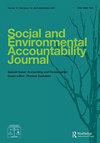弥合对可持续性会计和组织变革的理解
Q2 Business, Management and Accounting
Social and Environmental Accountability Journal
Pub Date : 2023-01-02
DOI:10.1080/0969160X.2023.2175508
引用次数: 0
摘要
会计、管理和组织研究(MOS)对加速人类引发的全球生态破坏的贡献越来越得到认可。因此,拟议的人类世地质时期需要对学科认识论、理论和方法论基础以及研究议程进行深刻反思(Bebbington等人,2019;Ergene、Banerjee和Ho ffeman,2021)。在过去的四十年里,社会和环境会计学术一直与可持续性会计和报告的潜力相结合,以引发变革性的组织变革。其影响在油田内外都受到质疑(Bebbington和Gray,2001年;Gray,1992年、2010年、2019年)。Garcia Torea、Larrinaga和Luque-Vílchez(2022)表明,组织研究对可持续性会计变革潜力的兴趣是有限的,尤其是与社会和环境会计领域对这一问题的关注相比。他们认为,SAR和组织变革之间的关系仍然是一个悬而未决的问题。作者在MOS和会计期刊上对53篇论文进行了深入的文献综述,重点关注组织变革和SAR之间的相互作用,其中十分之九的论文发表在会计期刊上。在列出综述文章的主要特征后,他们将这些特征与五个关键特征进行了映射:理论框架、方法、SAR类型(即内部或外部),更重要的是,SAR与变化之间的联系类型以及所提供的解释。他们在此分析的基础上勾勒出五座通往本文章由计算机程序翻译,如有差异,请以英文原文为准。
Bridging the Understanding of Sustainability Accounting and Organisational Change
The contribution of Accounting, Management and Organisation Studies (MOS) to the acceleration of human-induced global ecological disruption is increasingly recognised. Hence, the proposed geological period of the Anthropocene calls for a profound rethink-ing of disciplinary epistemological, theoretical, and methodological grounds as well as research agendas (Bebbington et al. 2019; Ergene, Banerjee, and Ho ff man 2021). For the past four decades, social and environmental accounting scholarship has been con-cerned with the potential of sustainability accounting and reporting to trigger transformative organisational change. Its impacts have been called into question inside and outside the fi eld (Bebbington and Gray 2001; Gray 1992, 2010, 2019). Garcia-Torea, Larrinaga, and Luque-Vílchez (2022) show that the interest of organisational studies in the transformative potential of sustainability accounting is limited, especially when compared to the attention paid to this issue in the social and environmental accounting fi eld. They argue that the relationship between SAR and organisational change is still an open question. The authors conducted an in-depth literature review in MOS and accounting journals of 53 papers focusing on the interplay between organisational change and SAR, with nine out of ten published in accounting journals. After laying out the main characteristics of the reviewed articles, they map these along fi ve key features: theoretical frameworks, methods, SAR type (i.e. internal or external) , and, more importantly, the type of connection between SAR and change and the explanation provided. They build on this analysis to outline fi ve bridges towards
求助全文
通过发布文献求助,成功后即可免费获取论文全文。
去求助
来源期刊

Social and Environmental Accountability Journal
Business, Management and Accounting-Accounting
CiteScore
3.90
自引率
0.00%
发文量
16
期刊介绍:
Social and Environmental Accountability Journal (SEAJ) is the official Journal of The Centre for Social and Environmental Accounting Research. It is a predominantly refereed Journal committed to the creation of a new academic literature in the broad field of social, environmental and sustainable development accounting, accountability, reporting and auditing. The Journal provides a forum for a wide range of different forms of academic and academic-related communications whose aim is to balance honesty and scholarly rigour with directness, clarity, policy-relevance and novelty. SEAJ welcomes all contributions that fulfil the criteria of the journal, including empirical papers, review papers and essays, manuscripts reporting or proposing engagement, commentaries and polemics, and reviews of articles or books. A key feature of SEAJ is that papers are shorter than the word length typically anticipated in academic journals in the social sciences. A clearer breakdown of the proposed word length for each type of paper in SEAJ can be found here.
 求助内容:
求助内容: 应助结果提醒方式:
应助结果提醒方式:


